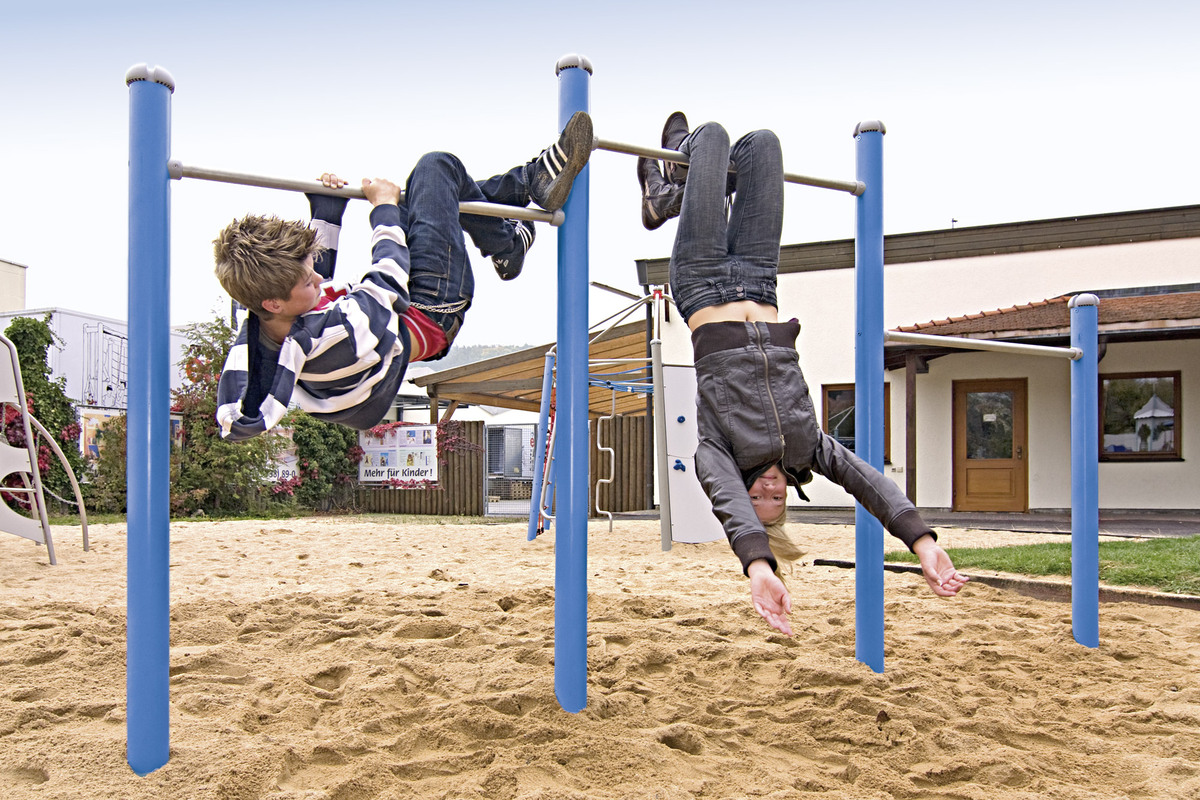Promoting self-awareness in children also means strengthening their body awareness and self-confidence. But for this, a child must be allowed to try things out. They need to know their limits, experience risks and be allowed to master challenges. The playground is an ideal place to test one’s own abilities. Educators and scientists have long agreed on one thing: for children, it is a risk not to take risks! Nevertheless, the amount of risk a child is exposed to when playing has been drastically reduced. In 1976, the catalogue of standards for playground safety comprised just 8 pages – the now common standard DIN EN 1176, on the other hand, is 80 pages longer! There is disagreement about how sensible such a package of safety rules for playground equipment and the like can still be. Playing without any risk at all does not do much for the development of a healthy self-perception – but of course, it is not possible to play without any safety precautions at all.
Table of contents
- Why experiencing failure is so important for children
- Encouraging self-awareness in children means letting go
- Under challenge means boredom – over challenge means frustration!
- Conclusion: Promoting self-perception in children – more courage to take risks
Why the experience of failure is so important for children
The process of “learning to walk” shows how essential failures are for children’s development and self-perception: every child has certainly fallen on their bottom more than once in the process. And that is also important! Only by falling can children develop their body awareness and learn to walk. Children who grew up with baby walkers, for example, may be able to walk, but they don’t know at all how to deal with a fall. As a result, unexpected, unpractised falls sometimes result in much worse injuries than children who have learned this right away. The acquisition of new physical skills can also promote self-awareness in children. But this only works by overcoming unknown situations. A little thrill is a lot of fun! Climbing unfamiliar heights, experiencing high speeds, playing with water – the best childhood memories are usually those that were also a bit risky.
Encouraging self-awareness in children means letting go
Safety is a constant focus, especially with only children. Parents usually assume the worst and imagine horror scenarios. The protective trend may stem from the fact that – despite the rising birth rate – one-child families are the norm. With large families, the handling of childlike free spaces was naturally much more relaxed. Accordingly, daily exercise has been drastically reduced. From 15 miles in the past, children nowadays walk only 80 metres – thanks to the car.
Many parents nowadays take all responsibility away from their children: On playgrounds, they are constantly there, judging every step, catching, guiding – the child no longer needs to decide anything on its own, but the real play doesn’t come about that way either. Yet, children want to master challenges in order to be able to assess themselves better. If you want to promote self-awareness in children, you should learn to hand over control to the child. Perhaps some of us remember how much more exciting it was to balance on the edge of the pavement than to simply walk along the path. Even as babies, we were constantly exploring and trying things out – the only way to learn about the world as a child.
Under challenge means boredom – over challenge means frustration!
In order to properly promote self-awareness in children, the following applies here, as with many other things: the right way is a good middle ground. Without dares and challenges, children cannot test their own abilities. Their self-perception remains underdeveloped, and that is a problem. Children need to learn to make decisions, to assess their own abilities and to deal with failure. For example, if they know about the safety precautions of a piece of equipment, there is a risk of overestimation, as they sometimes simply trust that the play equipment is safe. However, safety standards in playgrounds are important in that they prevent dangers that children cannot recognise. Fatalities or permanent damage to health must of course, be avoided at all costs. To this end, new playground equipment, in particular, must be checked for hidden dangers.
Conclusion: Promoting self-awareness in children – more courage to take risks
There must be a certain amount of risk so that children can develop – but it should be age-appropriate, perceptible and assessable. As soon as children are allowed to master challenges, they are also granted personal responsibility and a sense of control: “I did it on my own!” Such a feeling of elation is the basis for more self-confidence, independence and a healthy attitude of expectation. Children who have little confidence in their (physical) abilities, simply because they never had the chance to try them out properly, sometimes shy away from even effortless tasks. The fear of perceived failure is too great. By the way, exercise also benefits the child’s health. Challenges that children can grow from are therefore indispensable for good development! To promote self-awareness in children, parents and educators should show a little more courage to take risks.
Read more: 5 reasons why climbing is good for children? You can read them here!

